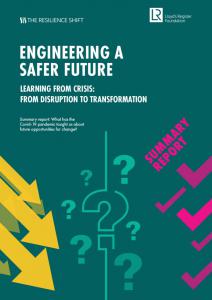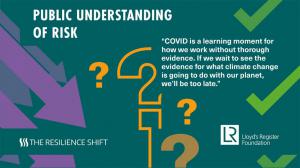LEADERS SHARE REAL-TIME INSIGHTS INTO THE VALUE OF COVID DISRUPTION
In a future likely defined by increasing systems integration and complexity, and large-scale shocks, how can Covid provide opportunities for transformation?
Thought leaders from 18 organisations - including the Alan Turing Institute, Imperial College, the National University of Singapore’s Institute for Public Understanding of Risk, the Open Data Institute, and the Royal Academy of Engineers - joined Lloyd’s Register Foundation and The Resilience Shift to explore the common challenges of the Covid-19 pandemic and the opportunities for change that the consequent disruption could offer.
Five virtual roundtable sessions in autumn 2020 focused respectively on safety at work, data and information systems, education, infrastructure, and public understanding of risk. The 31 handpicked participants were invited to share their insights from both the sector and the wider disruptions that all were experiencing, personally and professionally.
Key findings from the Engineering a Safer Future summary report include:
AN OPTIMISTIC BELIEF IN HUMANKIND - Human innovation and adaptation can be relied upon in a crisis and this is a cause for reassurance as we confront a world of ever-increasing volatility and uncertainty.
A PRACTICE-RUN FOR CLIMATE DISRUPTION - The Covid-19 pandemic is a model for the sort of disruptions we can expect to result from climate change – our response is both a cause for optimism and a heightening sense of renewed urgency to fight against complacency.
“COVID is a learning moment for how we work without thorough evidence. If we wait to see the evidence for what climate change is going to do with our planet, we’ll be too late.” Participant.
IT IS TIME FOR CONSCIOUS CHOICES - We have a brief window of time to make decisions about working patterns, technological platforms, education approaches and resilience measures we will implement as we move forward after Covid
SYSTEMS THINKING MUST BECOME COMMONPLACE - The Covid-19 pandemic has provided a global case study in the importance of understanding whole systems rather than their constituent parts and how those systems interrelate.
OUR RELIANCE ON TECHNOLOGY IS ITS OWN VULNERABILITY - Technology has proved a saviour but our rapid shift to remote working has left us even more vulnerable to disruptions of our technological systems and exacerbated and accelerated digital inequalities particularly in the global south.
HUMAN VS AUTOMATION - The transition to remote working means losing the ‘human glue’ of daily interactions in favour of highly transactional exchanges. These technological substitutions must be effective not just efficient, to best support human needs and mental health.
RESILIENT TO EXPECTED AND UNEXPECTED RISKS - Our inability to model specific consequences of the pandemic highlights the need for general resilience and organisational agility. Few planning models identified the specific consequences of the pandemic as they unfolded.
DATA MATTERS - We need to be sure that we are measuring the things that matter. Rigorously interrogating the narratives our data supports is critically important to shifting how we understand and value our world.
Professor Richard Clegg, Chief Executive, Lloyd's Register Foundation, said: “Lloyd’s Register Foundation’s collaboration with one of our long-standing partners, The Resilience Shift, brings together thought leaders and experts from our grants community and beyond to openly reflect on the lessons learned from the disruption of COVID-19. We hope that the insights from the roundtable sessions can strengthen our understanding of how we can build resilience and preparedness to global safety challenges.”
Dr Juliet Mian, Deputy Director, The Resilience Shift, said: “I was delighted by the path that all of these conversations took, where we reflected on our personal and work-related challenges and lessons learned, but then rapidly pivoted to the opportunities for transformation that were perhaps more difficult to identify at the beginning of 2020. There is evidence, both hard and anecdotal, that supports the importance of whole systems thinking, of recognizing complexity and of shifting engineering thinking and practice to be collaborative, diverse and inclusive.”
The full conversations, insights and takeaways for each sector, and overall, are explored in a series of five podcasts and short reports together with a summary report, published by The Resilience Shift in partnership with Lloyd’s Register Foundation at Engineering a Safer Future
NOTES FOR EDITORS
Lloyd's Register Foundation and The Resilience Shift developed Engineering a Safer Future, a series of conversations as an antidote to the pervasive online noise that confronts us as we seek serious discussion and meaningful insight into the impact of Covid-19. It is part of The Resilience Shift’s Learning from crisis series. Previous work in this series includes: Resilient Leadership, Cape Town Day Zero.
The following organisations participated in Engineering a Safer Future:
• Alan Turing Institute
• American Society of Civil Engineers
• BLOC – Blockchain Labs for Open Collaboration
• Coalition for Urban Transitions
• eThekwini Municipality, City of Durban, South Africa
• Gallup
• Imperial College
• Lloyd’s Register Foundation
• Lloyd’s Register Group
• National Safety Council
• National University of Singapore, Institute for Public Understanding of Risk (IPUR)
• Open Data Institute
• Royal Academy of Engineers – Engineering X
• Royal College of Art
• Sense about Science
• The Welding Institute
• Department of Engineering at the University of Cambridge
• University of York
ABOUT THE RESILIENCE SHIFT
The Resilience Shift, supported by Lloyd’s Register Foundation and Arup, has built a global community of interest from its roots in providing new collaborations, knowledge, tools and approaches to ensure a transformative approach to the resilience of critical infrastructure. www.resilienceshift.org
ABOUT LLOYD’S REGISTER FOUNDATION
The Lloyd’s Register Foundation seeks to secure for the benefit of the community high technical standards of design, manufacture, construction, maintenance, operation and performance for the purpose of enhancing the safety of life and property at sea, on land and in the air.
https://www.lrfoundation.org.uk/
Helen CIvil
The Resilience Shift
+44 7711 734456
helen.civil@resilienceshift.org
Visit us on social media:
Facebook
Twitter
LinkedIn
Legal Disclaimer:
EIN Presswire provides this news content "as is" without warranty of any kind. We do not accept any responsibility or liability for the accuracy, content, images, videos, licenses, completeness, legality, or reliability of the information contained in this article. If you have any complaints or copyright issues related to this article, kindly contact the author above.



